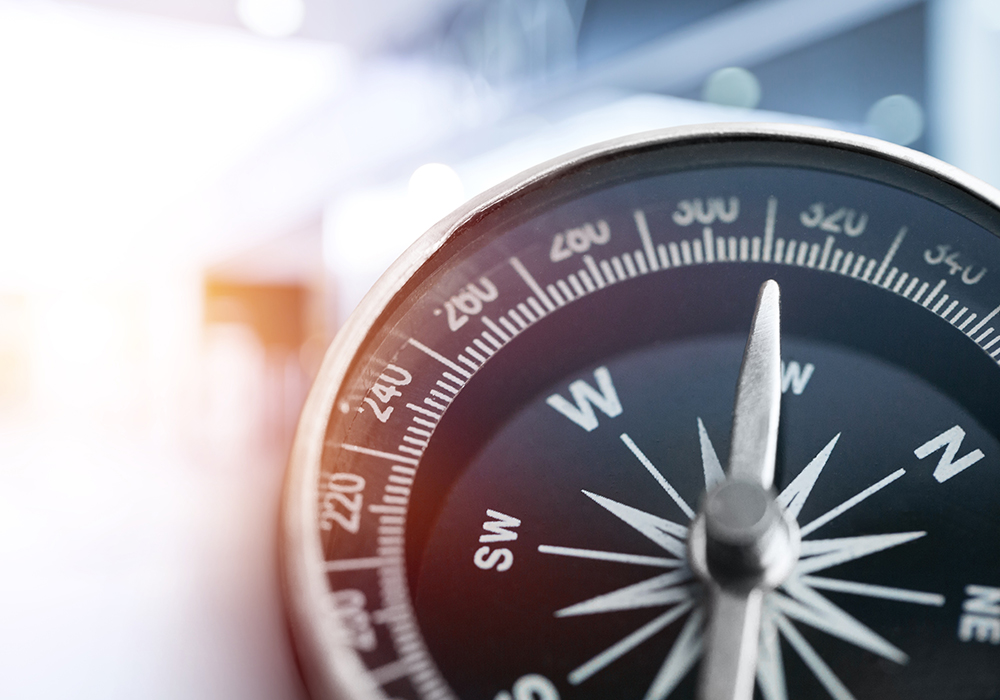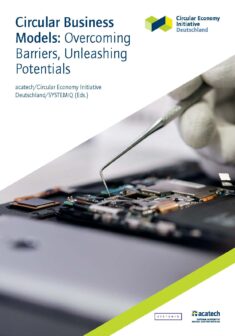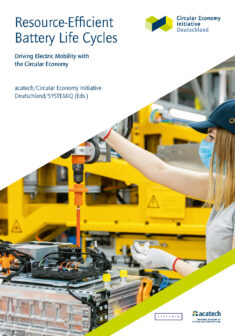Ditching the throwaway society: Germany’s path to a circular economy

Munich/Berlin, 12 May 2021
Most current patterns of production and consumption follow a linear “extract, produce, consume, dispose” model, the consequences of which include climate change and environmental pollution. A circular economy aims to fundamentally transform this model by optimising and – as far as possible – closing material and energy cycles. In its Circular Economy Roadmap, which was presented to the Federal Ministry of Education and Research, the Circular Economy Initiative Deutschland sets out the change processes required to make this happen. The roadmap provides government, science and industry with a series of recommendations for delivering the transition to a circular economy.
The “Circular Economy Roadmap für Deutschland” was presented to the Federal Ministry of Education and Research at the virtual event “Made with Germany” – Deutschland auf dem Weg zur Circular Economy (“Made with Germany” – Towards a Circular Economy in Germany). Michael Meister, Parliamentary State Secretary to the Federal Minister of Education and Research, commented that “We need a resource-efficient circular economy so that we can bequeath future generations a world in which they too can lead healthy and prosperous lives. The Circular Economy Roadmap für Deutschland sets out how science, industry, government and civil society can work together to achieve this goal.”
According to Susanne Kadner, Managing Director of the Circular Economy Initiative Deutschland, decoupling resource consumption from economic growth is key to the establishment of a circular economy: “Decoupling allows us to improve our quality of life and ensure fair prosperity without transgressing the planetary boundaries.” The Initiative has calculated that “by 2050, if Germany implements circular economy principles such as prolonging and intensifying product use and significantly increasing recycling, it could reduce its total primary raw material consumption by 68% compared to 2018.” She adds that the systematic realisation of a circular economy could help to simultaneously address several closely interconnected challenges[JB1] . These include climate change and the European Green Deal’s goal of becoming climate-neutral by 2050, but also resource utilisation, biodiversity and global health.
With today’s publication of the Circular Economy Roadmap für Deutschland, experts from science, industry and civil society hope to kick-start the transformation process needed to make this goal a reality in Germany. According to Thomas Weber, acatech Vice-President and Chair of the Circular Economy Initiative Deutschland, “Germany needs a comprehensive, integrated circular economy strategy with concrete targets for aspects such as waste prevention, recycling and total resource consumption. And it needs it sooner rather than later.” Implementation of the proposed measures should be coordinated cross-departmentally by the German government and supported by an interdisciplinary panel of experts. “A concrete market model for achieving greater circularity must be developed and implemented jointly by government and industry”, says Weber.
The above are just some of the Initiative’s recommendations for enabling a step-by-step transition to a circular economy by 2030. Martin Stuchtey, Managing Partner of Circular Economy Initiative Deutschland’s co-founder and partner SYSTEMIQ, describes one of the key requirements for achieving this breakthrough: “We need to realign financial incentives – including taxes, subsidies and the price of damaging the environment – to support business decisions that have an optimal climate and resource impact. In other words, economic actors should be penalised or rewarded in line with the amount of resources that they consume and their impacts on the environment.” As well as helping to protect the climate and biodiversity, these measures would support the development of innovative digital business models in line with the Industrie 4.0 model. “One example of this type of measure would be a shift in the emphasis of taxation towards carbon pricing and resource utilisation – although it would also be necessary to carry out further scientific analysis of the effectiveness of such measures.” The Initiative urges German policymakers to lead the way on the circular economy by promoting this and other issues within the European Union.
But according to Thomas Weber, we can’t leave everything up to government and the scientific community. Implementation of a circular economy will also require businesses to actively support an explicit environmental focus in industrial policy. “The Circular Economy Initiative Deutschland has formulated ten priority actions that show how, by implementing new business models, companies can transform themselves from product suppliers into “circular service” providers. In this way, for example, we can tackle the problem of plastic waste by creating a circular economy for plastics. Another example involves circular battery management, where resource scarcity could actually give rise to a whole new service industry. It is now up to us all to implement these proposals together – it’s a genuinely exciting prospect!”
About the Circular Economy Initiative Deutschland
Founded in March 2019, the Circular Economy Initiative Deutschland is funded by the Federal Ministry of Education and Research (BMBF). In addition to the BMBF, its members include the Federal Ministry for the Environment, Nature Conservation and Nuclear Safety, the Federal Ministry for Economic Affairs and Energy, 23 companies, 24 research institutions and various other civil society organisations with an interest in this field. Published today, the Circular Economy Roadmap Deutschland is a collaboration between more than 130 experts from different disciplines and industries. Alongside other inputs, it brings together the findings of the three Circular Economy Initiative Deutschland working groups on “Circular Business Models”, “Packaging” and “Traction Batteries”.
Further information
Circular Economy Initiative Deutschland
Circular Economy Roadmap Deutschland (German)




